- Home
- Alex Hughes
Sharp
Sharp Read online
Praise for
Clean
“Really well done.”
—USA Today
“A fun blend of Chinatown and Blade Runner.”
—James Knapp, author of State of Decay
“[A] tightly written futuristic detective story set in an alternate Atlanta. . . . This crisp debut marks Hughes as a writer to watch.”
—Publishers Weekly
“Reminds me very much (and very fondly) of Jim Butcher’s Dresden Files.”
—SF Signal
“An excellent start on a series . . . so many twists, turns, and double-crossings . . . I’m going to be first in line for the next novel in this Mindspace Investigations series.”
—Night Owl Reviews
“I am addicted to this world, this character, and this writer. Alex Hughes spins stories like wizards spin spells . . . a stellar debut!”
—James R. Tuck, author of the Deacon Chalk series
“Fans will want more by Alex Hughes.”
—SFRevu
Also Available by Alex Hughes
Clean: A Mindspace Investigations Novel
Payoff: A Mindspace Investigations Novella
SHARP
A MINDSPACE INVESTIGATIONS NOVEL
Alex Hughes
A ROC BOOK
ROC
Published by the Penguin Group
Penguin Group (USA) Inc., 375 Hudson Street,
New York, New York 10014, USA
USA | Canada | UK | Ireland | Australia | New Zealand | India | South Africa | China
Penguin Books Ltd., Registered Offices: 80 Strand, London WC2R 0RL, England
For more information about the Penguin Group visit penguin.com.
First published by Roc, an imprint of New American Library,
a division of Penguin Group (USA) Inc.
Copyright © Alexandra Hughes, 2013
All rights reserved. No part of this book may be reproduced, scanned, or distributed in any printed or electronic form without permission. Please do not participate in or encourage piracy of copyrighted materials in violation of the author’s rights. Purchase only authorized editions.
REGISTERED TRADEMARK—MARCA REGISTRADA
ISBN 978-1-101-61504-1
PUBLISHER’S NOTE
This is a work of fiction. Names, characters, places, and incidents either are the product of the author’s imagination or are used fictitiously, and any resemblance to actual persons, living or dead, business establishments, events, or locales is entirely coincidental.
The publisher does not have any control over and does not assume any responsibility for author or third-party Web sites or their content.
Contents
Praise
Also Available by Alex Hughes
Title Page
Copyright Page
Dedication
CHAPTER 1
CHAPTER 2
CHAPTER 3
CHAPTER 4
CHAPTER 5
CHAPTER 6
CHAPTER 7
CHAPTER 8
CHAPTER 9
CHAPTER 10
CHAPTER 11
CHAPTER 12
CHAPTER 13
CHAPTER 14
CHAPTER 15
CHAPTER 16
CHAPTER 17
CHAPTER 18
CHAPTER 19
CHAPTER 20
CHAPTER 21
CHAPTER 22
CHAPTER 23
CHAPTER 24
CHAPTER 25
CHAPTER 26
CHAPTER 27
CHAPTER 28
CHAPTER 29
About the Author
To my parents and to my grandparents,
who believed first.
CHAPTER 1
I stood in the observation room smoking, long sinuous trails of gray smoke drifting up into the ceiling. The recording technician coughed and turned the filter setting up even higher, the whirr of the motor the loudest sound in the place, the popping of ionizing energy removing the pollutants from the air. Even with the police department’s recent budget cuts, the filter was a solid, midrange-quality one, good enough to handle the smoke without blinking. With the air so bad out, we needed every advantage we could get.
With the higher setting, the tech stopped caring about the smoke, and I could focus on the pleasant little buzz of the cigarette without worrying about her discomfort.
On the other side of the one-way glass, in the interview room sitting alone, was a sweating overweight man in an old-style trucker hat and a shirt full of holes, decorated with the silhouette of a naked woman. His hat had a large fishhook clipped on the brim. A company uniform shirt, blue with white stitching, lay wadded on the table.
A knock on the door behind me made me look up.
“Put that out, would you?” the woman said with an odd pushy cheer. A plain blonde, she was hefty, tall, and focused. She must be new; we didn’t have many women in the department.
I tried to read her telepathically, and came up largely blank; since a case six weeks ago when I’d burned out my mind, I was struggling to recover, my telepathy coming back only in fits and starts. I’d seen enough old students go through the process, heck, helped them through the process, that I knew what to expect. I had rested like I was supposed to, done the exercises like I was supposed to, over and over again, and tried to be patient. I had some of the telepathy back—in the mornings, before two or three o’clock, before I was too tired and it got spotty again. Now was the hard part, when I had to keep from pushing, when I had to keep from setting myself back.
I could read a lot of people at surface level now, if the waves of their minds transmitted through Mindspace strongly enough, if they had Ability even the barest touch above the normal population. The new detective had to be as normal as they came, her mind not “speaking up” enough for me to hear, even though it was early in the day. Either that or we had poor valence, the waves of our minds syncing up badly. Either way it was disturbing, like meeting someone blindfolded with cotton balls in your ears.
I put the cigarette out, reluctantly, since she’d asked.
“Who are you again?” she asked. “I don’t think we’ve met yet. I’m Lisa Morris.”
“I’m Adam, the telepath consultant.” I was a Level Eight, or had been; incredibly strong, and trained very well by the Telepath’s Guild, who’d kicked me out years ago. But I wouldn’t tell her; normals were nervous enough around weaker telepaths. And neither she nor the rest of the department could know I’d hurt my brain. I needed this job.
She stuck out a hand, but I didn’t take it. “Sorry. Telepath rules, right?”
I nodded, tried a sheepish smile.
“I’m the new detective,” she said to cover the awkwardness. “New transfer from South DeKalb. Working under Bransen’s detective division. Primarily Robbery, though I pick up the occasional armed assault.”
“Nice to meet you. So, what’s the situation?” I clarified: “With the guy on the other side of that glass.”
“Ah. Thomas Hunter. He drives a truck for a company on Lawrenceville Highway. Seems an upstanding guy, salt of the earth, or at least as much as you’d care about. His record’s clean. But his truck was hijacked by armed robbers this morning, and his supervisor says it’s the second time.” She shrugged. “Plus he’s lying.” A good cop has an instinct for liars.
“You want to know what’s going on.”
“Sure. I want to know what’s going on. I also want to fill out the paperwork to the TCO on time and get a day off this week. Right now none of that looks likely, but they say you’re the best.”
I shifted my shoulders. “No pressure or anything.”
The technician stifled a laugh. Morris shrugged.
“Why Tech Control Organization forms?” I asked. Since the Tech Wars sixty years ago, since a madman had taken control of the semisentient computers and destroyed a good third of the world, since people had died, rotting in their houses and cars, their implants turned into computer-virus transmission platforms, since people had died in the millions in horrible ways, well, the world was afraid of Tech. Even now, with the smaller stuff—the oven timers and basic chips of the world—let out, cautiously, on a leash. Even now the stronger, more powerful stuff was forbidden, tracked, and shut down.
“The company Hunter works for manufactures capacitors, resistors, basic glucose and carbon-based circuits for use in artificial organs, and copper wire.” At my blank look, she added, “Components for electronics. Add in the biologic support systems . . .”
“And you get Tech,” I said. “Basic Tech, with the potential for more. A lot more.”
“Yeah, the scary stuff. The components themselves aren’t illegal, but . . .”
“Yeah.” I swallowed. “Like shipments of fertilizer, you watch them. And when they disappear, you react. Let me go get my files.”
* * *
A hijacking victim wasn’t my usual shtick. Usually I got the difficult cases, suspects who wouldn’t talk and witnesses who wouldn’t talk about anything useful—anyone who’d gone through another interrogator and survived unscathed. But I was open to new challenges, and with any luck I wouldn’t need the telepathy too much.
I carried the stack of files under one arm and a couple of bad coffees in the other. Bellury was today’s babysitter, a semiretired cop who didn’t mind me in his head and cheerfully gave me advice as to the best way to legally threaten suspects. A good guy, steady, hard to rattle, hard to surprise.
I’d sent Bellury ahead to talk to the trucker a few minutes ago, to act as friendly as he could, and to offer him a sandwich and a cup of coffee. The sandwich wouldn’t ever appear; neither Bellury nor I was giving up our lunch today. But the coffee was doable, and we’d at least get him thinking the moment wasn’t as hostile as it looked.
The files were props, cases solved when my grandparents were in diapers, full of pictures of various shock levels and lightly printed notes you couldn’t quite read upside down. I probably wouldn’t need them this time around, but I’d be lying if I said they didn’t make me feel better.
I paused at the door, put down the files and coffee on the floor, and messed up my hair. Unbuttoned the top button of the shirt, set the collar crooked. In an ideal world, I’d grab a set of old-fashioned glasses too, since they’d announce like a highway board that I didn’t have the money for the corrective procedure. But I didn’t want to spend the time. We had a full interview docket today and I couldn’t afford to get too behind.
I took a breath. Thomas Hunter. Considering the hat . . .
“Tommy,” I said in bright tones as I entered the interview room. Bellury looked up, found himself a chair in the corner with an amused look.
“Tom,” the trucker said firmly. He backed up from the table, clearly preparing to move if a fight should come up.
“Sorry about that,” I said, jovially. Or at least, as jovially as I could pull off; cheerfulness wasn’t a specialty. Bellury stifled a laugh, but I don’t think the suspect noticed.
Tom was too busy moving his weight forward, watching me carefully to see what violence I’d bring on. This was a man who’d been in more than a few bar fights, I thought. The question was, how’d the hijackers take him down without at least a few bruises? I couldn’t feel any pain coming off him, just wariness and a tinge of guilt not inappropriate for his situation. He’d lost a shipment, after all. For the second time.
“Mind if I sit?”
“It’s your table.”
“You know, you’re right.” I settled into the chair like I didn’t have a care in the world. This was the clean interview room, the table in good repair, the walls spotless and empty except for a small mirror on the wall.
I fanned out the files on the table and made a show of looking for a pen. Bellury behind me had one, but, as requested, he waited a good forty seconds before offering. I wanted to look as bumbling as possible.
Finally he held out that pen.
“Thanks,” I said, and took it with an uncomfortable laugh. Might have overshot; the trucker was looking at me oddly. I opened the file—the one without the pictures—and made a show of reading it. Just when the trucker seemed to be getting uncomfortable, I looked up. “Says here your truck was hijacked by robbers.” I added a questioning lilt to the end of the sentence, the kind of raised tone most people heard as indecisive.
“That’s right,” Tom said gruffly.
“Armed? They had guns?”
“That’s right. I already told the other guy all of this.”
I made a show of blinking in surprise and went back to pretend-reading the file. “Oh, gotcha. You were transporting electronics components.”
“Yeah? So?”
“Things that could be made into illegal Tech.” The raised lilt again, like a question.
“I suppose.”
“Well, there’s special procedures for these situations. Paperwork stuff. If you’ll work with me, we’ll get you out of here as quickly as possible.”
Up close, Tom looked less stereotypical. His shirt, while worn, was scrupulously clean. The fishhook on his cap looked usable. He was completely without a sunburn. And there was a light in his eyes, an awareness of his surroundings, that made me size him up differently. There was muscle under that fat.
“How long am I going to have to be here?” His voice was firm, and while the accent was slow and Southern, the firmness wasn’t anyone’s fool.
Ah, a stress point. I shifted in the chair, body language more alert. “It’s up to you. We just need you to tell the truth about what happened.”
He winced like I’d socked him in the jaw. Interesting. I reached out in Mindspace—and suppressed a sigh. This job was a lot harder when you couldn’t read the suspect clearly. At least I was getting a little low-grade emotion, had no headache, and I only had two visual light flashes this morning, symptoms of my brain rewiring. I still wished I could read him, though. It was frustrating.
Well, we’d do this out loud, where the recorders could see us and Bellury could testify to their accuracy. It was what Tom said that mattered, anyway. Or, well, if Tommy bothered him . . .
“Tommy,” I said.
“Tom,” he corrected. “And who are you?”
Ah, lovely. I wouldn’t even have to offer a prompt this time. I leaned forward, a cheerful shark nibbling on the prey. “I’m a Level Eight telepath,” I said. “If you ask, I’m legally required to tell you. I’m also required to warn you that touching a telepath can be hazardous to your health and mental well-being.” It was true—or was when the telepathy was working—and it always made the normals nervous. The Guild—and the end of the Tech Wars—had made sure of that.
He pushed back from the table, eyes wide. “It wasn’t like that, really. You don’t have to make a—”
“Ah, but I do,” I said. When in doubt, push where they’re uncomfortable. There’s always something there. “I do, Tommy, really I do. If you hadn’t lied to the nice detective lady, well, then maybe—”
“I told her, I didn’t see anything.”
“But you were lying,” I pushed, with the ring of truth in my voice. The certainty that came with being a telepath. Bluff in this case, but . . .
We balanced on a knife’s edge for a long moment, then he broke.
“They took my driver’s license,” he burst out with in a rush. “You have to understand, they took my license. They told me they knew where I lived. They knew where my family lived. And then they . . .”
> Success. “And then they what? They told you if you didn’t help them, what, Tommy?”
He leaned forward, over his hands, on the table, hands clenched around the blue uniform shirt wadded on the table. I could feel him thinking, shapes changing like a lava lamp inside his brain—but not the content. Finally he spoke. “My daughter is four. She’s a good kid. She’s smart. She deserves . . .”
My tone got quiet. Soft. “They said they’d kill her if you talked to anyone.”
He nodded.
“I know anyway,” I said. Pure bull in this case, but you were allowed to lie to suspects. Even to witnesses. I gentled my voice. “You might as well tell me what happened. Help us get these guys off the street. Keep them from coming back.”
He hesitated.
“Tell me, and work with the sketch artist. It’s the best chance you have now of keeping your daughter safe. Of keeping yourself safe.”
He hesitated again. “They said . . .”
“You’ve been at the station a long time now,” I said gently. “They might take it badly anyway. They probably will. But if you help us catch these guys, Tom. If you help us get them off the streets, they can’t hurt you—they can’t hurt your daughter. It’s your best bet out of this, I promise you. Tell me what happened.”
He swallowed, his eyes on his hands. I let him think, my body language sympathetic. I let the wheels turn.
Finally he reached out and grabbed the shirt in front of him. “You won’t tell the company?” A faint, out-of-focus thought came from him, barely strong enough for me to pick up. It must be important; it must be a strong thought for me to hear it. He’d lose his job if the truth got out. He’d helped them. . . . He’d had no choice, but he’d helped them.
“I’ll do everything in my power to keep this confidential,” I promised, my voice pitched to be trustworthy. “I’ll do everything I can. We’ll even try to send out a unit to watch your family. We’ll help you figure out how to get them out of town if you want. But you have to help us.”

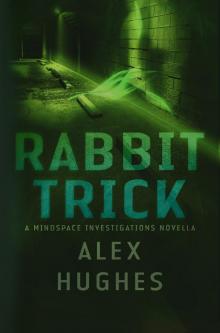 Rabbit Trick: A Mindspace Investigations Short Story
Rabbit Trick: A Mindspace Investigations Short Story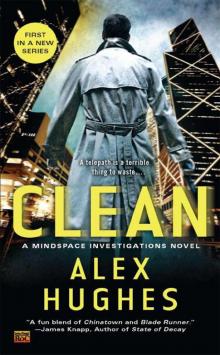 Clean: A Mindspace Investigations Novel
Clean: A Mindspace Investigations Novel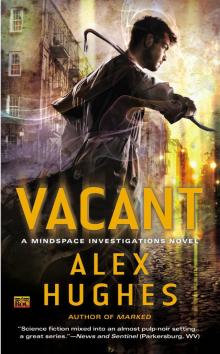 Vacant
Vacant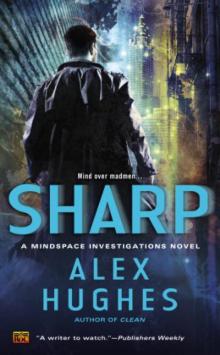 Sharp: A Mindspace Investigations Novel
Sharp: A Mindspace Investigations Novel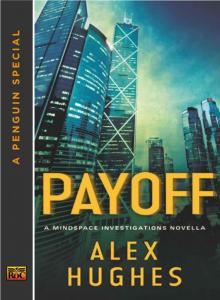 Payoff
Payoff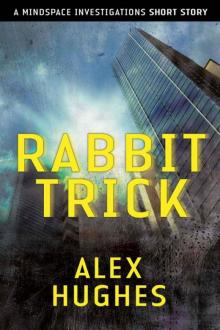 Rabbit Trick: A Mindspace Investigations Novella
Rabbit Trick: A Mindspace Investigations Novella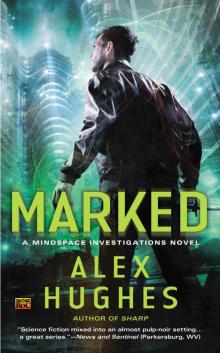 Marked
Marked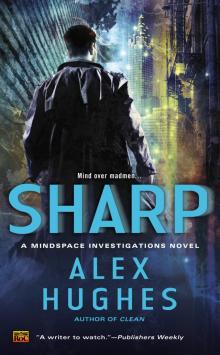 Sharp
Sharp